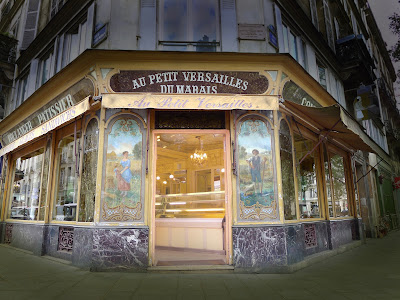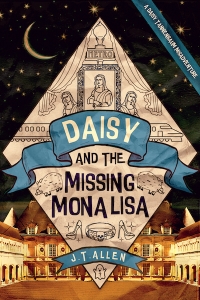10. Paris Death March
Aug 21, 2019 by Mr. Allen
 “Shall we do the monuments?”
“Shall we do the monuments?” I was barely awake, buttoning my coat, chasing Aunt Mill as she whisked across the courtyard and out the carriage door. Just before stepping through the door, I glanced back and spotted Sief, nose mashed against a window three flights up, frowning down. Just five minutes before that, Aunt Mill had charged into my bedroom with that obnoxious, singsong, sappy-happy voice that my mom uses in the morning. They might as well blow a bugle in your ear. You get blasted out of deep sleep, traumatized for life, unable to resist the power of suggestion: put on your clothes, brush your hair, get going, up-up-up, march-march-march, we are going to have fun today if we die doing it.
“We’ll catch a croissant at Au Petit Versailles,” said Aunt Mill, striding ahead down rue Vieille du Temple. It was cold and clear, light the color of dead flesh. “They make beautiful, flaky, buttery, perfect croissants and we’ll catch them right out of the oven.” I stubbed my toe on a curb, rasped an inch off my knee cap, put a hole in my jeans. Aunt Mill turned back to see me rolling around like a flipped-over June bug, clutching my leg. “Are you all right?”
Teeth clenched, I nodded, struggled up, limped on.
“Let’s take you out of our neighborhood, shall we? There’s plenty here of course: the Hôtel Salé around the corner, the Musée Carnavelet just a little further on, the Musée de la Chasse. But you can discover those on your own. Let’s see the big tickets, just so we can say we did, so we can cross them off our list and all that.” The sidewalk was narrow, so I hobbled on behind her, mood darker than the sky, wishing I had a knife to throw into her back.
But all that changed when we stepped into Au Petit Versailles du Marais. The placed glowed. The smell instantly grabbed your stomach and made you happy to be alive. The ladies behind the counter sang out, “bon jour m’dame ‘moiselle,” like they came from the land of eternal spring, like they’d never skinned a knee or thought an evil thought, like they loved this hour of the morning more than any other.
Briskly, Aunt Mill ordered four croissants and briskly a pink-cheeked, sparrow-voiced, white-smocked, madame tucked them into a thin paper sack and made change and wished us a “bonne journée” as we floated out. Or at least I floated out. You are never so starved as just after you’ve purchased a croissant that you can’t yet eat.
By the time I emerged from croissant bliss and was able to notice anything else, we were charging west down rue de Rivoli, passing the Hôtel de Ville again. Aunt Mill was going on about how the Hôtel de Ville was built by Francois I, burnt down by the Commune, whoever that was, in 1871, and rebuilt to match the original. She handed me a second croissant. Buttery bliss.
We passed Tour Saint Jacques again. Yikes this lady walked fast. I pointed out that we were going by the street where Sief’s rat shop was.
“Yes, down rue des Halles, which leads to the belly of the beast.”
“The what?”
“It used to be the central food market for all of Paris.”
I nodded. Things looked familiar. The city was stitching itself together for me, or at least this tiny part of it.
“Rue de Rivoli,” said Aunt Mill, “is one of the longest in the city. The first part of it was built by Napoleon, named after one of his battles in Italy, then Baron Haussman continued it, driving it right through Les Halles, connecting it with rue Sainte Antoine.”
We marched on, then hooked left where rue de Louvre changes into rue Admiral Somebody-Or-Other. As we walked into the center of the Cour Carrée, Aunt Mill said she was taking me to one of her favorite spots in Paris.
We stood there a long time, Aunt Mill breathing in the air like it was somehow different than all the other air in Paris. She went on about it for a full five minutes, how unique the architecture was, built by blah-blah, rebuilt by blah-blah, how the style was blah-blah, and the statues were symbolic of blah-blah and blah-blah, how the stone came alive at certain hours of the day and “just glowed.” I nodded, wishing she’d dole out the last croissant she had in her purse before it froze.
I don’t mean to knock the place. The Cour Carée was cool. But I was tired of walking already, half asleep, still hungry, knee throbbing, plus I wanted to ask Aunt Mill a hundred questions about codes and diamonds.
Yet on we went, exiting south, crossing the Pont des Arts, where all the lovers ink their names onto locks and lock the locks onto the bridge—suspended forever over a watery death, so to speak. The wind, of course, smashed its way down the river and sucked the warmth out of us, Aunt Mill pausing forever to point out interesting things as I tried to shrink my neck into my coat like a turtle. I hardly heard any of what she said, wondering instead if lovers came with keys in the middle of the night to remove the locks when things went bad. Or did they just add new locks? A person like Clymene could have ten locks on the bridge by now. Eventually it would collapse under the weight.
We marched onward. Aunt Mill pointed out the College de Quatre Nations, roost of the Acadamie Française, saying that if it looked a bit like the Capitol, in Washington D.C., that was because we modeled our dome after theirs.
West along the river we went, my hands jammed into pockets, fingertips numb, along the Quai Anatole France, passing the Musée D’Orsay, “a must see” according to Aunt Mill—though clearly we weren’t destined to see it today—once a railway station, where, during the Commune (again the Commune) they set up a hot air balloon factory to make the balloons that floated mailmen over the Prussian lines to give news of the fate of Paris.
We swept past l’Assemblée Nationale, Aunt Mill noting that it was, “like our house of representatives. The columns match the Madeleine church, which we passed on your first day, on the way to the Embassy School. This is the south end of the cross. Remember the cross? At the center, is the Place de la Concorde.” We soldiered on across Pont de la Concorde, into the huge space with the tall, pointy, Egyptian thingy in the middle, while a never ending stream of cars, vans, buses, and taxis tore past, filling nostrils with icy exhaust.
“So this is where the guillotine was set up?
“One of them. There were several actually. They did a lot of business for awhile. Over there is The Tuileries Garden. Let’s cross over.”
Aunt Mill pointed out the Orangerie, were the king’s oranges grew, and the Jeu de Paume, his private tennis club. Finally I just blurted, “Aunt Mill, what happened to the diamonds?”
She had to think about it awhile. “You mean from the necklace Jeanne de la Motte stole?”
I nodded, “the book I read said some of the diamonds were sold in London and others in Paris, but it sounded like most of the necklace, or some of the necklace anyway, was never even found.”
“That’s one theory.”
“What’s the other?”
“There’s more than one. Some speculate the diamonds were recovered by agents of the crown and secretly returned to Boehmer and Bassanges because the king didn’t want more scandal, others that the whole necklace was broken up and sold off, but that they could never track down the fences.”
“You mean like someone who sells stolen stuff?”
“Exactly. They were obviously exceedingly hot diamonds, so even with all the police spies at the time, the Eighteenth Century underworld just clammed up tight. That seems unlikely to me though, considering how much criminals like to blab, especially when they are trading down convictions. There’s another theory, that they were smuggled to America, and another, that one of the participants, perhaps Contesse de la Motte herself, hid some part of them—buried them, put them in a deposit box, or tucked them under a floorboard. Did you read about Retaux and Villette?”
“The husband and boyfriend.”
“Right. They bo—”
By this time we’d strolled across the Tuileries, passing the giant Ferris wheel, crossing the rue de Rivoli. We were walking under the Napoleon Arcade with flocks of tourists, when, mid-sentence, mid-syllable even, Aunt Mill whipped out her cane as a boy sprinted by, catching him in the throat, knocking him flat.
It happened so fast and with such violence, I was still processing it a minute later. Just as the boy—eight maybe, dark eyes, dark tangled hair, filthy clothes, foul smell—smacked down on his back, a woman, six steps away, started screaming, “My purse! He’s taken my purse!”
Aunt Mill had somehow spotted the kid making the snatch even before the woman knew and when the kid came our way, Aunt Mill laid him out. She poked her cane into his chest, jerked the purse out of his hand, and held it out to the woman—sunglasses, Hermés scarf, expensive camel coat.
“Oh-my-god, thank you!”
The waif, or gypsy, or whatever he was, rolled over, popped up, and dashed away without a word, lost instantly in the crowd. The woman thanked Aunt Millicent about a thousand times, offered to buy us lunch, dinner, pay us, have us to her house in the Hamptons, but Aunt Mill demurred and we scooted on. My mouth was hanging open, eyes, no doubt, bugged out and inch or two.
“Let’s see, where were we?” she said. “Oh-yes, Retaux and Villette. They both died before Jeanne, so they might have taken a secret with them, but it seems unlikely, since they were both tortured by the police. If anyone took a secret with them, it would have been la Motte herself, when she plunged from the window.”
By this time we were half way up the rue de Castiglione, getting a first glimpse of the Place Vendôme. Aunt Mill was already explaining that the first column had been erected by Napoleon to celebrate the victory at Austerlitz but that it had been pulled down during the—you guessed it—Commune.
“You think she was murdered?”
“Jeanne de la Motte? I do, yes.
“I read it might have been an accident.”
Aunt Mill smiled and looked at the column a moment. “Well, Daisy, there’s an adage, among people who deal in this kind of thing, that no one ever accidentally falls out of a window. It’s either a suicide or a murder. And, by the way, one of the hardest kind of murders to trace.”
“Really? Who says that?”
“Spies mostly.”
“I never knew that.”
“Why would you?”

